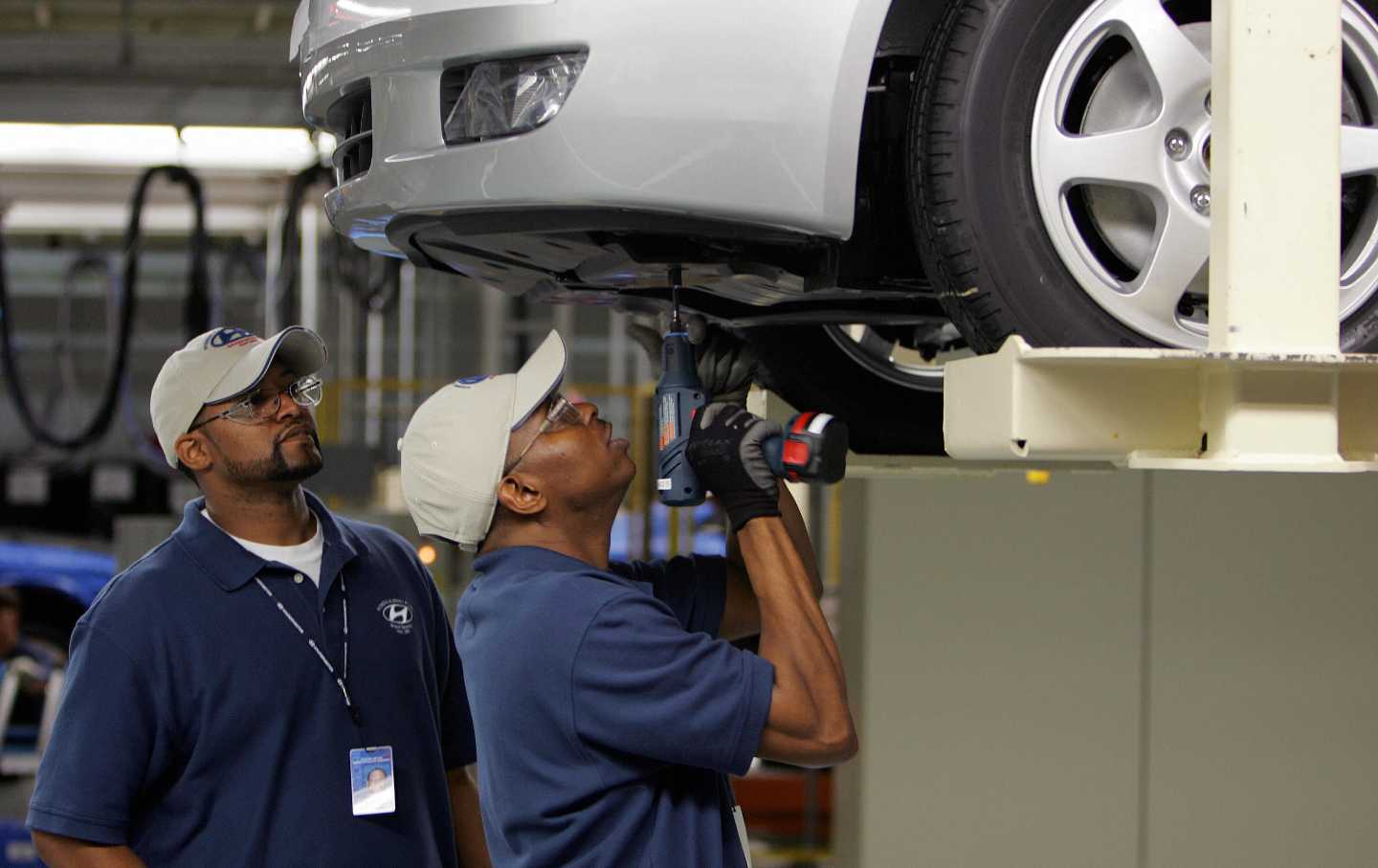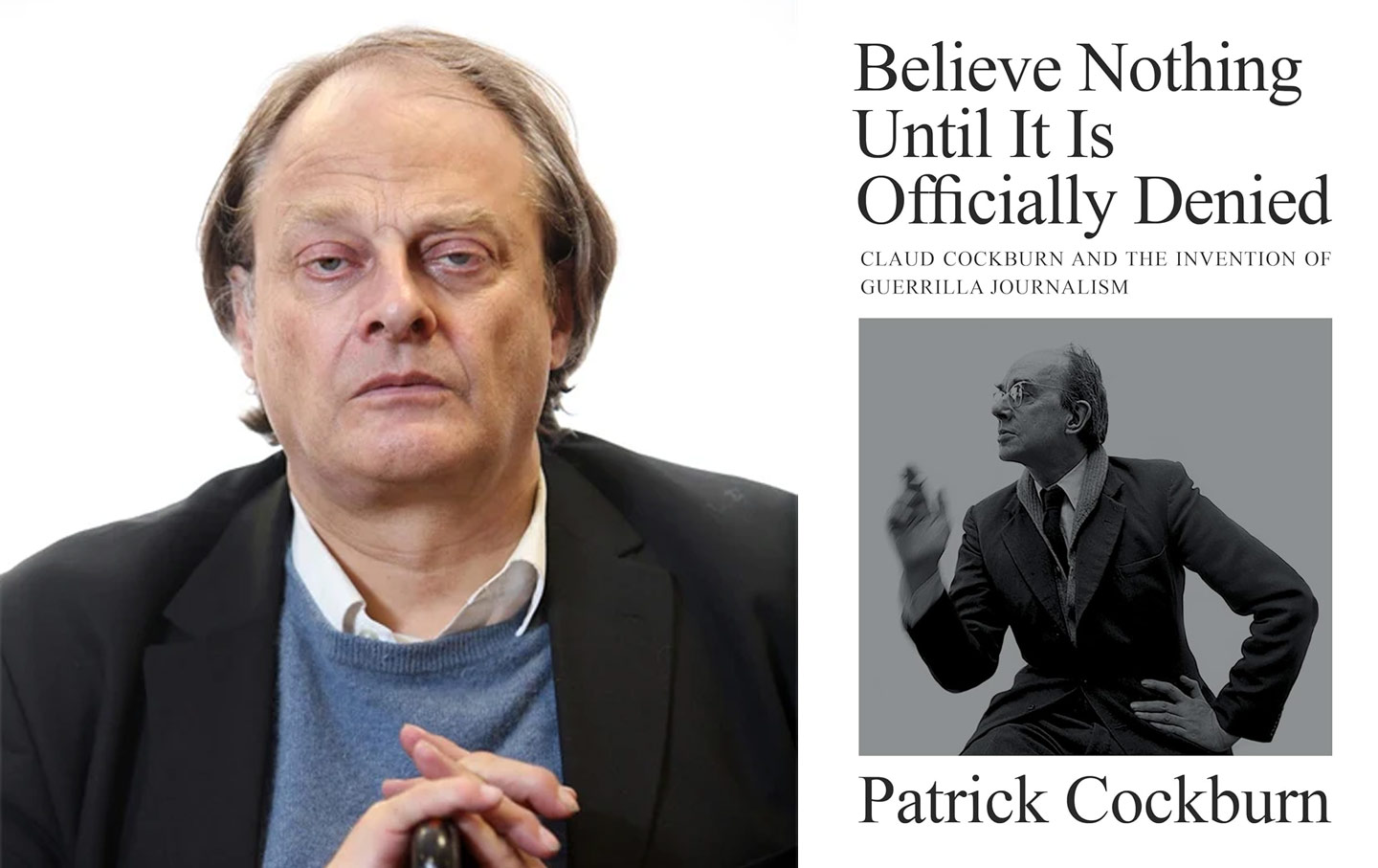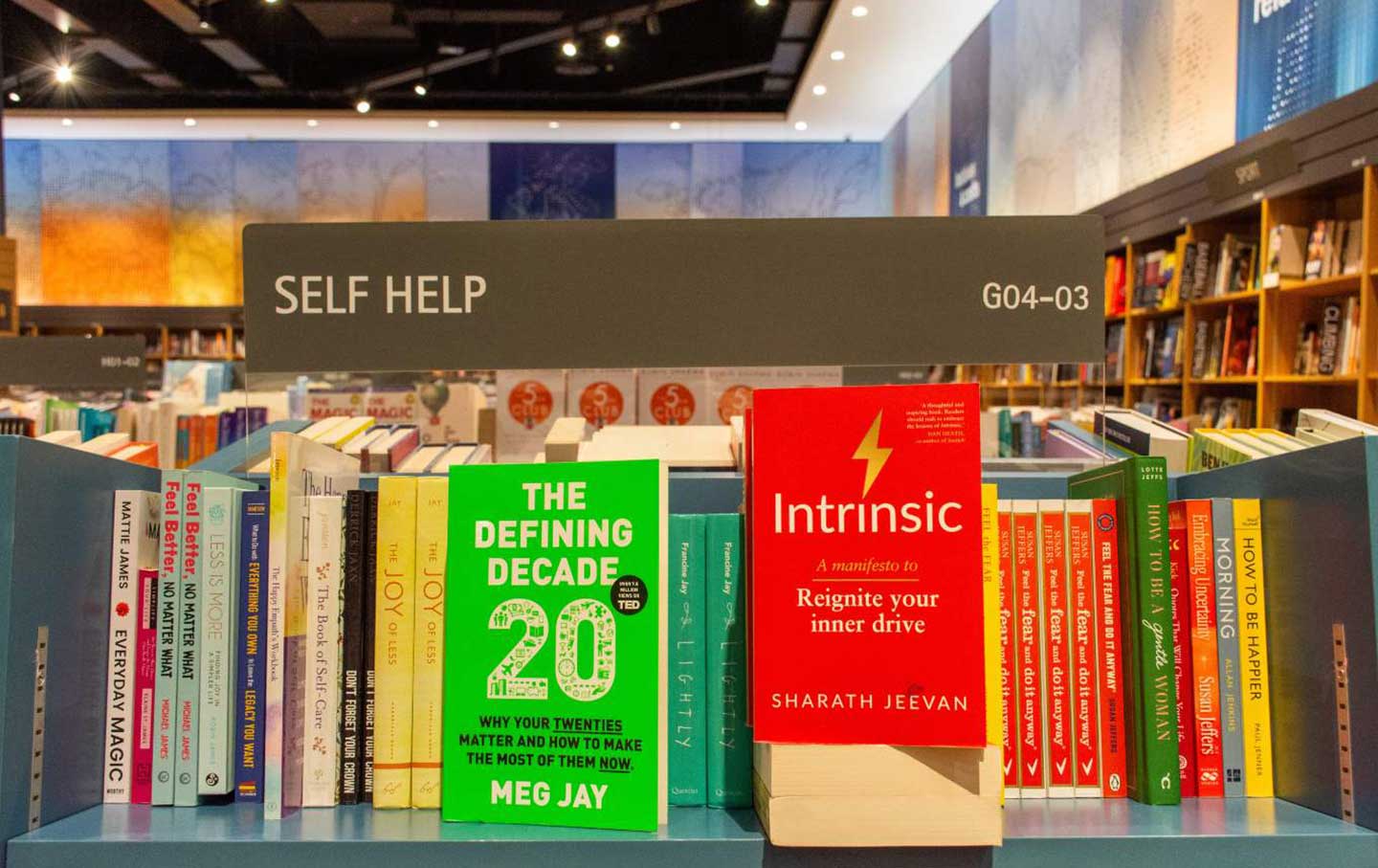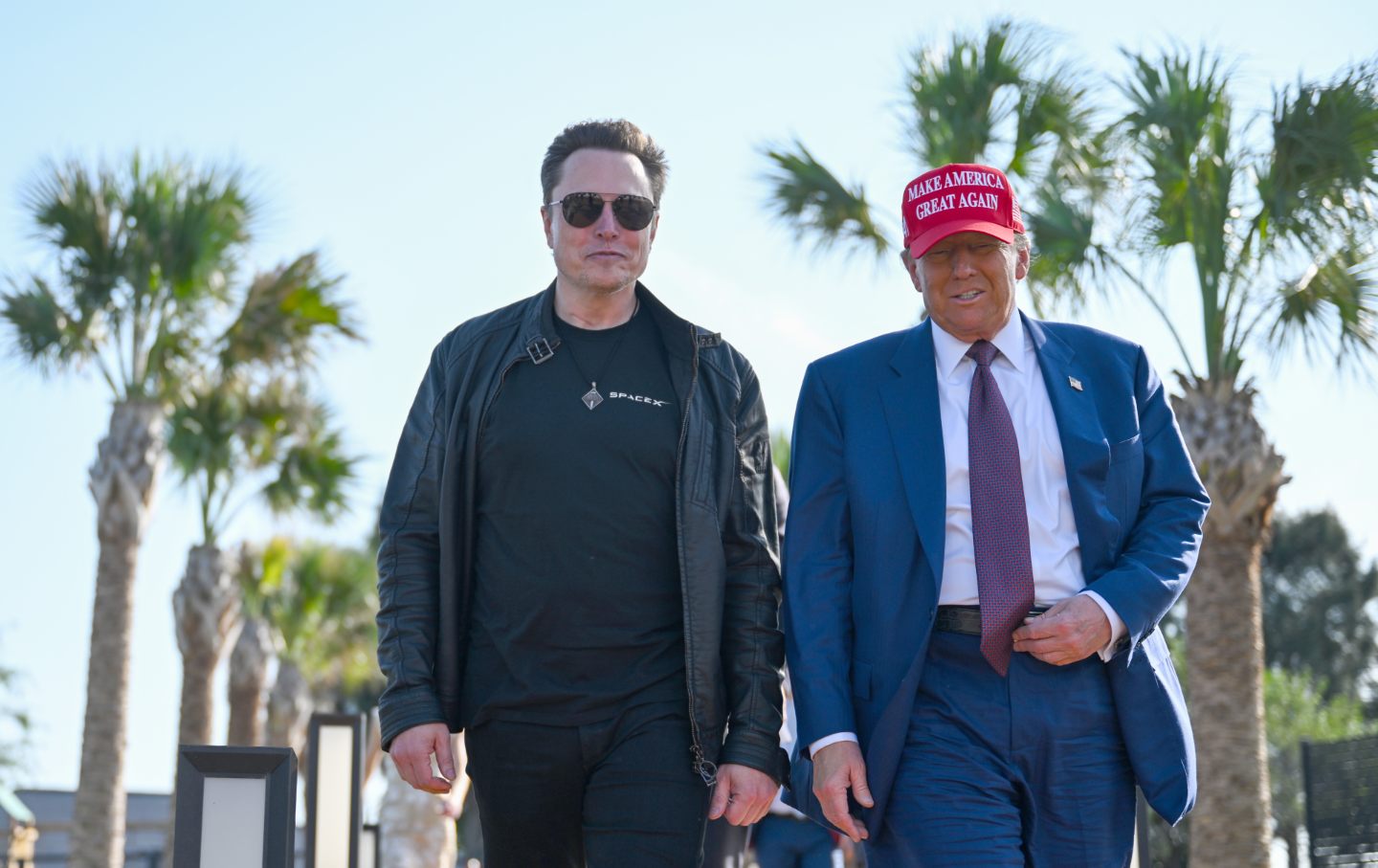Can the UAW Finally Organize the South?
Postwar failure to organize the South entrenched racism and corporate greed. Now there’s a chance to course-correct.

It was the week before school started, and my mother and I had pulled into the parking lot at Korvette’s—a discount department store in Northeast Philadelphia—ready to load up on pencils, pens, composition notebooks, and other supplies, when she stopped dead and said we were going elsewhere. Noticing my confusion, she said simply, “We don’t cross picket lines.” And so began my political education.
Many years later, at Nation associate editor Andrew Kopkind’s kitchen table in Vermont (where much of my higher political study took place), I met Jack O’Dell, a once-blacklisted ex-communist who had provided the fundraising muscle for Martin Luther King Jr.’s campaigns and was a key adviser to Jesse Jackson’s presidential campaign at the time. It was O’Dell who tipped me to the importance of Operation Dixie, the Congress of Industrial Organizations’ campaign to unionize Southern workers, launched in 1946. The effort was brought down by the same postwar Red Scare that ushered in the Taft-Hartley Act (forcing many unions to purge their most effective organizers) and decades of bloated military budgets (championed by defense intellectuals, corporate profiteers, and cold-warrior union leaders alike).
But in describing Operation Dixie as “a promise abandoned,” O’Dell—who’d been a National Maritime Union organizer during the campaign—offered more than just a history lesson. He wanted people to understand that failing to organize the South had left racism and reaction unchallenged, setting back the civil rights movement by a decade and handing corporations an effective Southern strategy for resisting labor’s demands.
Which is why I was so excited to see the United Auto Workers president Shawn Fain commit to organizing in the South—a promise whose first fruits may well come later this month, when over 4,000 workers at Volkswagen’s plant in Chattanooga, Tennessee, will vote for the third time in 10 years on whether to join the UAW. Previous votes have been thwarted by a combination of ineffective organizing and political threats by the state’s ruling Republicans—who have not restrained their opposition. But should the UAW succeed in Chattanooga and go on to win at Mercedes in Vance, Alabama; Hyundai in Montgomery; and Toyota in Troy, Missouri—not to mention Tesla—the effect may well be more long-lasting than anything else that happens in 2024.
Imagine a South where a unionized manufacturing workforce holds politicians to account, and where the bounds of the politically possible have more in common with a progressive powerhouse like Michigan—a state whose Democratic leadership has passed major legislation on abortion access, LGBTQ+ rights, public education, and voting rights and rolled back a decade-old right-to-work law—than a plantation economy like Mississippi. Imagine—if you can—empowered workers like the members of the Machinists Union at Boeing, who recently demanded a seat on the company board. Imagine—if you dare—a Democratic Party liberated from its addiction to dark money and the corporate donors who provide it.
Thanks to the UAW campaign, workers at Tesla have already received a raise. But as Bryce Covert reports in our cover story, money may not be enough to buy love from Elon Musk’s much-abused workforce. Other instances of the power of solidarity in this issue can be found in Michelle Alexander’s prophetic riff on King’s 1967 anti–Vietnam War speech; in my own interview with Gillian Slovo, whose play Grenfell: In the Words of Survivors opens this month in New York; and in Arturo Cano’s fascinating profile of Claudia Sheinbaum, who will almost certainly become Mexico’s first woman (and Jewish) president.
Not to mention Chris Lehmann’s terrifying account of the rise of Trump-inflected Christian messianism; David Klion’s clinical dissection of the disaster that is Joe Biden’s foreign policy (also covered in Gaby del Valle’s review of Jonathan Blitzer’s history of the border crisis); Alana Pockros on Lauren Oyler and the rise of “Internet criticism”; Rachel Hunter Himes on Harlem modernism; Bijan Stephen on the return of the rapper Kid Cudi; and Daniel Bessner bidding farewell to Curb Your Enthusiasm. Plus our brilliant columnists, stunning illustrations—and a new column, “Rethinking Rural.” It must be springtime at last!

D.D. Guttenplan
Editor
Independent journalism relies on your support
With a hostile incoming administration, a massive infrastructure of courts and judges waiting to turn “freedom of speech” into a nostalgic memory, and legacy newsrooms rapidly abandoning their responsibility to produce accurate, fact-based reporting, independent media has its work cut out for itself.
At The Nation, we’re steeling ourselves for an uphill battle as we fight to uphold truth, transparency, and intellectual freedom—and we can’t do it alone.
This month, every gift The Nation receives through December 31 will be doubled, up to $75,000. If we hit the full match, we start 2025 with $150,000 in the bank to fund political commentary and analysis, deep-diving reporting, incisive media criticism, and the team that makes it all possible.
As other news organizations muffle their dissent or soften their approach, The Nation remains dedicated to speaking truth to power, engaging in patriotic dissent, and empowering our readers to fight for justice and equality. As an independent publication, we’re not beholden to stakeholders, corporate investors, or government influence. Our allegiance is to facts and transparency, to honoring our abolitionist roots, to the principles of justice and equality—and to you, our readers.
In the weeks and months ahead, the work of free and independent journalists will matter more than ever before. People will need access to accurate reporting, critical analysis, and deepened understanding of the issues they care about, from climate change and immigration to reproductive justice and political authoritarianism.
By standing with The Nation now, you’re investing not just in independent journalism grounded in truth, but also in the possibilities that truth will create.
The possibility of a galvanized public. Of a more just society. Of meaningful change, and a more radical, liberated tomorrow.
In solidarity and in action,
The Editors, The Nation








